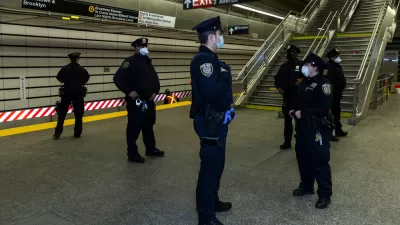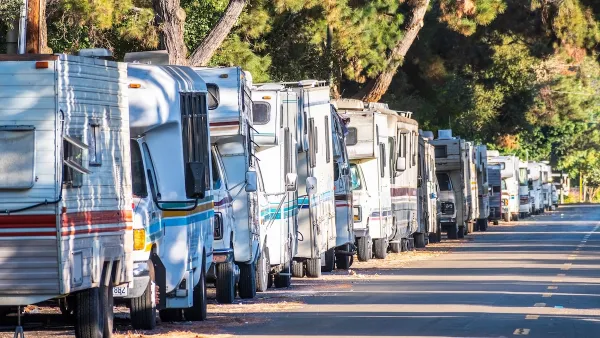A rule requiring the city to provide shelter for unhoused people is being eroded as city officials claim local agencies can’t keep up with growing demand.

A longstanding ‘right to shelter’ mandate in New York City is slowly being rolled back in response to an influx of migrants seeking asylum, causing alarm among housing advocates who say the policy has been instrumental in keeping the city’s unsheltered population low, despite the high number of unhoused residents. Sarah Holder and Kriston Capps cover the story for Bloomberg CityLab.
“The city says that the mayor does not seek to end New York’s right to shelter, but rather is asking the court for relief, since no party could have imagined the current situation when the consent decree was signed four decades ago.” As of 2021, the city’s network of shelters can accommodate 65,000 people, making unsheltered homelessness in New York a fraction of what it is in other cities with high unhoused populations.
The administration says the city is now having a hard time fulfilling the obligations of the decree as more people arrive in the city seeking shelter. “Under the mandate, homeless families with children who arrive at a shelter before 10 p.m. must be given a shelter bed the same night they request one, and single adults must be taken in within a day.” The city says demand grew by 75 percent in the last year.
Some housing advocates say the policy does need to be updated to support the adoption of more modern solutions such as the ‘housing first’ approach. As it stands, Ann Oliva, CEO for the nonprofit National Alliance to End Homelessness, says “the city is wedded to funding shelters at the expense of more permanent solutions.”
FULL STORY: What Ending ‘Right to Shelter’ Could Mean for New York City’s Homeless Population

Maui's Vacation Rental Debate Turns Ugly
Verbal attacks, misinformation campaigns and fistfights plague a high-stakes debate to convert thousands of vacation rentals into long-term housing.

Planetizen Federal Action Tracker
A weekly monitor of how Trump’s orders and actions are impacting planners and planning in America.

San Francisco Suspends Traffic Calming Amidst Record Deaths
Citing “a challenging fiscal landscape,” the city will cease the program on the heels of 42 traffic deaths, including 24 pedestrians.

Defunct Pittsburgh Power Plant to Become Residential Tower
A decommissioned steam heat plant will be redeveloped into almost 100 affordable housing units.

Trump Prompts Restructuring of Transportation Research Board in “Unprecedented Overreach”
The TRB has eliminated more than half of its committees including those focused on climate, equity, and cities.

Amtrak Rolls Out New Orleans to Alabama “Mardi Gras” Train
The new service will operate morning and evening departures between Mobile and New Orleans.
Urban Design for Planners 1: Software Tools
This six-course series explores essential urban design concepts using open source software and equips planners with the tools they need to participate fully in the urban design process.
Planning for Universal Design
Learn the tools for implementing Universal Design in planning regulations.
Heyer Gruel & Associates PA
JM Goldson LLC
Custer County Colorado
City of Camden Redevelopment Agency
City of Astoria
Transportation Research & Education Center (TREC) at Portland State University
Jefferson Parish Government
Camden Redevelopment Agency
City of Claremont





























